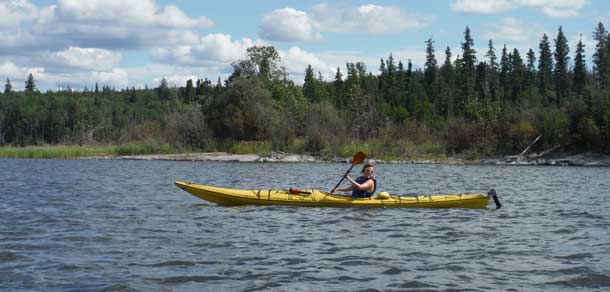When Kelsey Hewitt, Engineer-in-Training looks out over Lake Athabasca from her workplace, she often finds herself thinking back to childhood fishing trips.
“My family used to go fishing up north with my grandpa every summer so I grew up with a love of the outdoors and the northern woods. When I found there was a way to make a career working in northern Saskatchewan, it was like a dream come true,” Hewitt says.
Based out of Saskatoon, Hewitt is a geological engineer working for O’Kane Consultants, a subcontractor on the Saskatchewan Research Council’s Project CLEANS (Cleanup of abandoned Northern sites), the massive effort to clean up the abandoned uranium mines and tailings areas in the Uranium City area.
“I always knew that I wanted to work outside and initially I had looked at environmental engineering. After taking some geology classes in college, I was attracted to the broader considerations in geological engineering – with the structure of the rocks, the water and the other aspects of the natural environment. It isn’t like other types of engineering where you can make things do what you want them to do. You have to listen to what nature is telling you and then design a solution that fits that structure.”
Home Away From Home
Project CLEANS isn’t Hewitt’s first experience with field work. Her longest stretch was as an intern on a drilling project in Esterhazy in 2012.
“In those southern projects, it was always great the way the community stepped up to welcome us. There isn’t always a lot to do in small towns but in Esterhazy in particular the town would bring in entertainment and give us special booking times at the local bowling alley.”
At Project CLEANS, Hewitt works specifically on the area’s tailings facilities, taking samples and ensuring that contractors are meeting the specifications of the project. She works two weeks in, two weeks out at the site from May to October.
“It’s great to be back home but after a while, especially about halfway through the winter, I start to miss being at camp. There such a wonderful atmosphere of familiarity at camp. At home, things are always changing. But at camp, it’s always the same people having the same conversations and telling the same jokes. There’s something very comforting about that.”
Social Life in a Tin Can

The Project CLEANS workers live in converted shipping containers.
“That doesn’t sound too glamorous but it’s better than some camps I’ve been in. They’re roomy enough that everyone gets their own room and some storage space. There’s a satellite feed for the shared TV, phone and Internet area.”
“There’s only a few TVs and they are usually tuned to hockey or UFC pay-per-view fights, which is what the guys like to watch. I’m not into that so much but I don’t mind because it’s more the social aspect of it.”
Although city dwellers might think that life in camp would quickly get boring with limited access to media, Hewitt finds that human nature quickly fills that void with ordinary socializing.
“The single biggest thing we do to pass the time up here is talk. We talk and joke with each other for hours on end, about everything and nothing.”
Surviving Camp Life
There are many things about life at camp that Hewitt enjoys, like the stark beauty of the North, the view of Lake Athabasca and encounters with wildlife. But life in a remote camp has many challenges so Hewitt has picked up a number of tricks over the years.
“First thing, you need to have a good base layer on all the time to deal with the cold.”
“Before you leave, you have to make sure to load up on months’ worth of entertainment – books, podcasts, videos on your computer. Noise cancelling headphones are also important when you’re living around a lot of other people.”
“Dry shampoos and conditioners are great – they save you from worrying about liquids exploding in your baggage.”
“And, last but not least, packing cubes are amazing. They not only help you maximize your luggage but, on site, they help you keep your stuff organized and make efficient use of your small storage area.”
Can’t Get Enough
You might think Hewitt would get enough of the northern woods at work, but even in her free time she continues to answer the call of the wild. Even though camp life may seem quite rugged to the average city dweller, Hewitt and her friends like to get even further back to basics.
“Every summer for the past three or four years, some friends and I have canoed up the Churchill River. We camp out in the wilderness and cook our own food. As a kid, I spent every summer at our family cabin so as soon as summer hits, I want to be outdoors as much as possible. Even in winter, I spend a lot of time snowboarding. Basically, every opportunity to be outdoors, I take it.”
